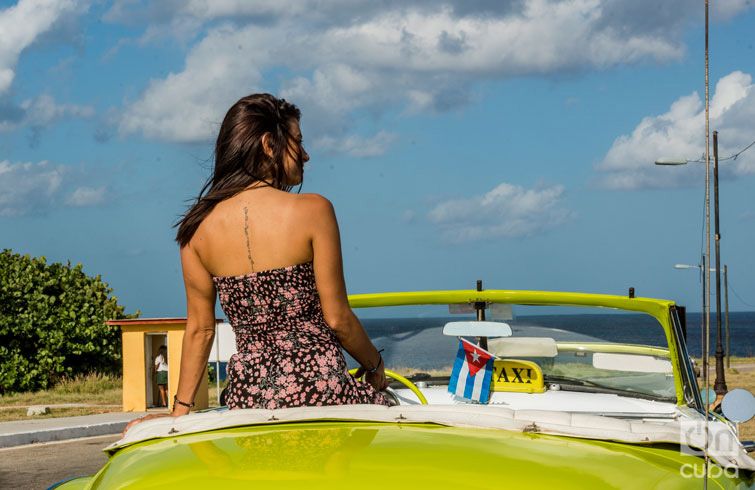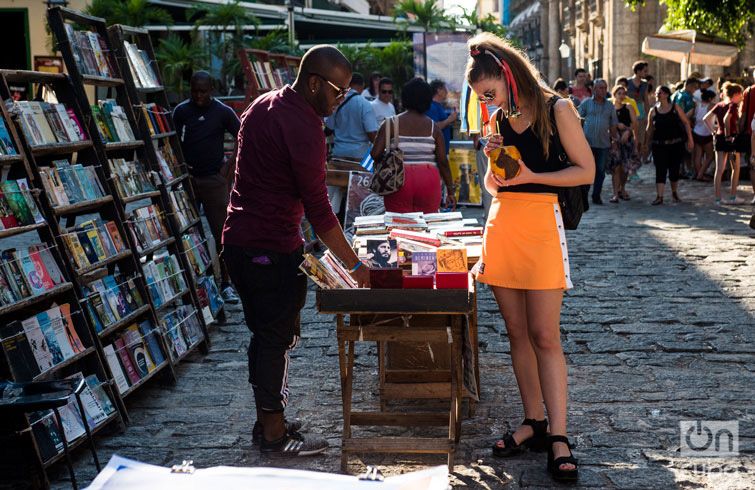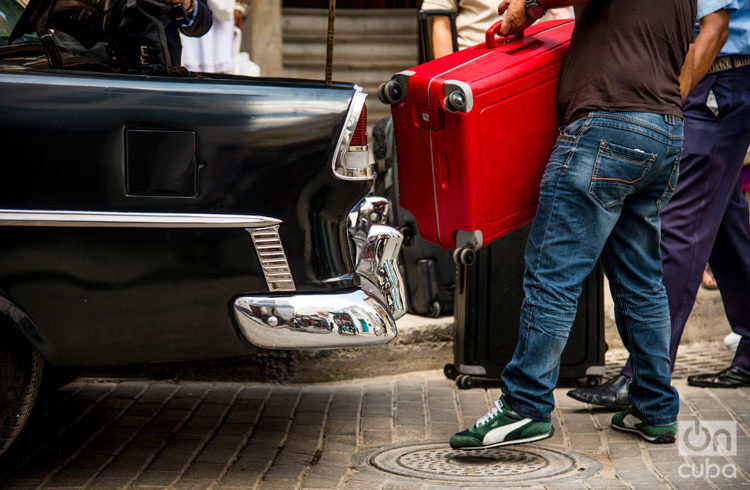In its process of interaction and engagement with Cuba, the former U.S. administration gradually modified the regulations of the Cuban Assets Control (CACR) to work in favor of its own objectives: “to get involved with and empower the Cuban people,” and “to increase the contacts to support Cuban civil society.” This was done several times since 2009. The last one was on March 15, 2016, before President Obama’s visit to Cuba. In this context the Office of Foreign Assets Control (OFAC) and the Department of Commerce Bureau of Industry and Security (BIS) announced “significant amendments” to the CACR in several senses, one of them: to allow “non-tourist personal trips,” a measure to clear the way for commercial flights, which had already been announced in January of that year.
Starting then going to the island would be simpler: it was no longer necessary to do so in groups or packages, but rather individually – the self-certification -, a variant that some named face-to-face. You only had to fill out an application form declaring the person’s educational purpose to be able to travel to Cuba. In fact, with the regular flights it was possible to book a ticket to Cuba online, as it is done to travel to Buenos Aires, Paris, Moscow or Burundi.
In February 2016 both governments signed a bilateral memorandum of understanding to reestablish direct regular flights based on what had been outlined in the third round of talks in Washington DC (December 14-16, 2015). In principle, 110 daily flights to Cuba on U.S. airlines were established, connected with the Havana, Camagüey, Cayo Coco, Cayo Largo, Cienfuegos, Holguín and Manzanillo international airports, among others. An additional measure of the outgoing executive to try to cement his policy before concluding his second and last term in office involved that sector of the economy, undoubtedly one of the most dynamic and with a good lobbying capacity.

The result did not take long in coming. The number of American travelers started to significantly increase. Suffice it to point out that, excluding the Cuban Americans – free as the wind because of those same Obama policies -, 282,937 Americans went to Cuba in 2016, the equivalent of 7{bb302c39ef77509544c7d3ea992cb94710211e0fa5985a4a3940706d9b0380de} of the visitors who arrived that year: 4.1 million. According to Josefina Vidal, former head of the U.S. Department in the Cuban Foreign Ministry, between January and May of 2017 some 284,565 Americans traveled to the island, which is equal to the amount of those who arrived the previous year. These are a type of tourists with economic peculiarities that differentiate them from others, and avid to touch with their own hands the forbidden island. And also the Havana Club Rum, mojitos in the Bodeguita, Cohibas, Buena Vista Social Club and other stories about Cuba and its culture which had been established in the national imagination for a very long time. If the Cuban Americans (166,455) are added to those figures, a clear and different data strikes you: the United States was reaffirming itself as the second issuer of travelers, only surpassed by Canada.
The Trump administration’s changes in the policy toward Cuba were at last announced last Friday June 16. Much ado about nothing. Like a ferret that has taken out some substance from the egg, leaving it practically intact, but dressing it with old clothes. A quick revision in relation to Americans’ trips would reveal as a minimum the following:
- The presidential Memo signed in Miami puts an end precisely to that individual variant, not to trips to Cuba. In effect, the flights and the cruises will continue, although with obstacles and problems, starting with a decrease in the flow. This will have a specific impact on the Cuban economy, but there is consensus on both sides that it will not be the end of the world. The tourist industry is not tied to only one market, and it has gotten to where it is without the U.S. presence, no matter how welcome it is.
- What is sought, among other things, is the “prosperity of the Cubans and the Government’s independence.” However, cancelling the self-certification will produce inevitable damage to the emerging private sector, which for some time now has been sending messages in the style of Mexican films: “Stop defending me, pal.” According to estimates, the non-state sector receives around 31{bb302c39ef77509544c7d3ea992cb94710211e0fa5985a4a3940706d9b0380de} of the dollars coming into the country from tourism, between B&B, private restaurants (paladares) and the rental of almendrones or those old convertibles in which Americans usually take a lot of pictures, by the urban ruins or the Capitol Building. As is recalled, during the last two years 40 million dollars were transferred from the United States to those new entrepreneurs, who by the way also include horizontal tourist guides, in other words, under the counter. But there are other regular patrons who have been offered those same services: Germans, French, Italians, Britishers and even Chinese, Russians and Japanese. A saying by the locals, experts in the art of searching, capturing and surviving, sums it up: “a falta de pan casaba” (literally meaning that if you can’t eat wheat bread you eat cassava bread).
- When placing the Cuban military as a sort of apeiron, the fact that they pay taxes to the State for the income obtained in their tourist facilities frequently remains in parenthesis. If what as a last resort it’s about depriving them of those dollars, the fate of the new policy would be to concentrate the U.S. travelers in official installations. The classical boomerang or shooting yourself on the foot. Based on Trump’s speech, the federal bureaucracy has been given a period of 90 days to announce the new regulations, one of them the list of places where Americans can stay. Obviously, the houses and even the private hostels don’t have sufficient capacity to accommodate more or less larger groups, except perhaps some exceptions of rigor that only serve to verify the validity of the regulation. To say it in a more graphical way: the government will forbid them from staying in the Manzana Kempenski, a Gaviota joint venture with that Swiss chain, but not in the hotels belonging to Gran Caribe, Islazul, Palmares or other chains not controlled by the aforementioned. There is no other alternative. In Cuba there are no private hotels but rather, at the utmost, joint.
- By eliminating the self-certification, an aspect/value of U.S. culture is also affected: individuals’ role in their own decision, as well as the freedom to choose. The Airbnb online booking offered multiple options for diverse pockets, and clients went directly from the airport to the chosen private home without any official mediation. Now they have no other choice but to go back and enroll in a supervised group experience. According to experts, this “employee, consultant or group agent must accompany each group to make sure each traveler maintains a complete program of educational exchange activities.” But as always, this is very difficult to control. It would be an interesting exercise to confirm in crude reality if, for example, some of them can be prevented from going to Santa María del Mar or another beach during an empty space in the program, and they always exist. Like going to Egypt and not going to the pyramids. Or leaving Paris without going to the Eiffel Tower. Or Greece without the Acropolis – in short, what the tourism technicians call “brands.” And furthermore if they can block that certain lost spirits go on their own to any of the CIMEX Corporation’s restaurants or to any of the Habaguanex bars in the very attractive Old Havana, admirably restored by maestro Eusebio Leal and his collaborators. Perhaps there is nothing as educational as having a drink with a Cuban, interacting outside the program, the beginning of the end of the stereotypes and finding convergences.
- The new regulations not only would have an impact on the private sector, but also on Airbnb and the airlines. As also will be recalled, for the first Cuba is the market with the fastest growth, the no. 9 most popular destination, more than Australia, Germany, Holland and Thailand: 70,000 monthly guests. The second would see demand decrease, something already taking place not just because of market reasons and competition, but also because of the component of uncertainty ever since last February the much-talked-of as well as feared full revision of the Cuba policy was announced.
- Lastly, the federal bureaucracy will demand from U.S. travelers things keeping receipts for five years in order to certify where they stayed, which could introduce in many consciences the idea that it wouldn’t be worthwhile going through that long road, much more so when the Cuban infrastructure is not precisely characterized for its functionality and efficiency, despite the new developments in tourism. And with almost proverbial characteristics like slowness and the quality of services – which those visitors do not forgive -, of which not even the new entrepreneurs are exempt. It’s thus better to go to the Dominican Republic, Aruba or Cozumel. Less complicated.

All this comes while a bipartisan bill (Flake/Leahy) is trying to put an end to a violation of Americans’ constitutional rights, that is to say, the fact that they can freely travel to countries like China and Vietnam, and even to the North Korean big black beast, whose political systems, like the Cuban, are governed by communist parties. What Trump does prolongs and deepens something that was already there, in some way reduced: the existence of two categories of Americans: one of Cuban origin that can travel as many times as it wants to the island, and the other of non-Cuban origin that must respect federal regulations which restrict their rights.
Based on this focus this is essentially the (new) view of dawn in the Tropics.










